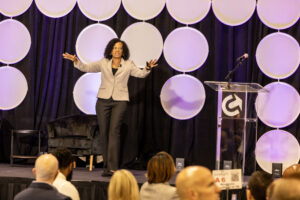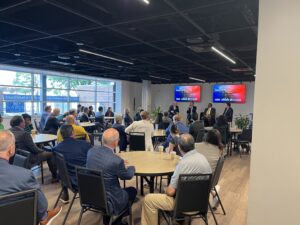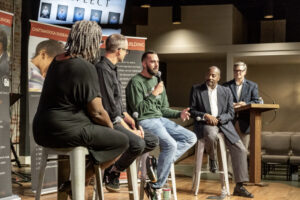Christina Siebold, Q Strategies
fL2XegcVhQg
If your daily grind involves helping your organization or clients tell their story to customers, vendors, regulators and investors, your work has changed dramatically.
One day, you’re planning brand-boosting events and thought leadership media relations, the next, you’re speed reading your crisis management plan and drafting coronavirus communications recommendations. In your free time, you’re sifting through hundreds of emails from every brand you’ve ever engaged with – from your grocery store to your salon to the sandwich shop around the corner.
Most public health experts agree that the COVID-19 pandemic is developing into an unprecedented modern-day crisis for the healthcare system, and the ripple effects of that anticipated impact will alter business as usual for months to come.
For communicators steeped in traditional crisis response plans, COVID-19 looks very different than the siloed crisis scenarios we’ve been trained to manage. It is not confined to one company, industry or sector. It is not bound by geographical constraints. In this new environment, we will soon learn what strategies are useful and applicable, and which strategies no longer serve us and our organizations.
One key concept still critical for our survival and success in the age of coronavirus is the importance of understanding and meeting the expectations of our stakeholders.
1. Meeting expectations helps maintain and build trust – the critical currency in a crisis.
As in any relationship, your connection with your clients is built on trust – their trust that you’ll do what you say you’ll do, that your expertise makes a difference in their success, and that you are an ethical operator.
In a crisis, expectations can shift daily, so meeting them becomes more difficult. Operating in a shifting environment leaves some leaders wary of communicating until they have all of the answers. While the concern is valid, the response should be resisted. Customers will understand that you’re making the best decisions given the information you have at the moment, and that may change. Delaying communication in search of the perfect solution will not meet the expectations of your stakeholders.
But what is driving these shifting expectations?
2. Understanding expectations begins with the influencers: regulators, legislators and elected officials, neighbors, friends, that guy from church, Twitter.
As with most of life in the 21st century, our stakeholders’ expectations are fashioned in consultation with a wide range of influencers. Our customers’ frame of reference is not shaped by one anchor on one evening news broadcast, or from their one mayor in their one town, but by every news source – reputable or not – and every data point they uncover on social media.
In this particular time, be aware that your customers are evaluating your performance and response based on the performances of countless competitors and colleagues. What is deemed an “appropriate response” is driven not only by an address by their own state’s governor, but by the news conferences of governors across the country.
Employers are judged by the work-from-home and paid leave policies of employers in every industry, not just your own.
Landlords are measured by the compassion and flexibility shown in the best corners of Twitter, not by the legal letter of the leases signed.
Brands and event planners are remembered for their swiftness to act and their refund policies, not the number of update emails circulated.
So how can we keep up with the shifting tide of expectation?
3. The Reasonable People Standard
Helio Fred Garcia captured this concept in a recent presentation for the Public Relations Society of America. In times of uncertainty, when decisions with deep consequences are to be made, he cites one defining question.
“What would reasonable people appropriately expect a responsible organization and leader to do in this situation?”
In promoting this standard to internal leadership, keep in mind that “reasonable people” should include your current and potential customers and stakeholders, not every Instagram thought leader. They may influence your customers, but your goal cannot be worldwide acceptance and accolades. Narrow the focus to your stakeholders and their expectations, and your business will be positioned for recovery.
Final word:
More than ever, communications professionals will be called upon to represent the voice of the customer to internal audiences. Understanding, tracking and accurately interpreting our stakeholders’ expectations during the age of COVID-19 will be one of the greatest measures of success for the organizations we all advise.
Q Strategies is a full-service, strategic planning and communications firm located in downtown Chattanooga. With collective experience of more than 75 years in strategic marketing and communications, we excel in strong community relationships that drive our success as we help clients tell their stories and reach their goals.









